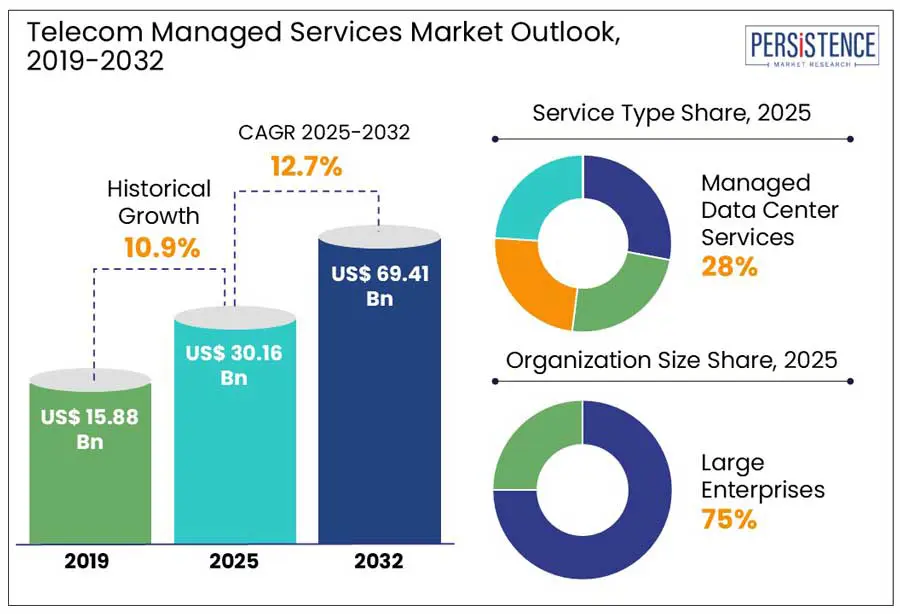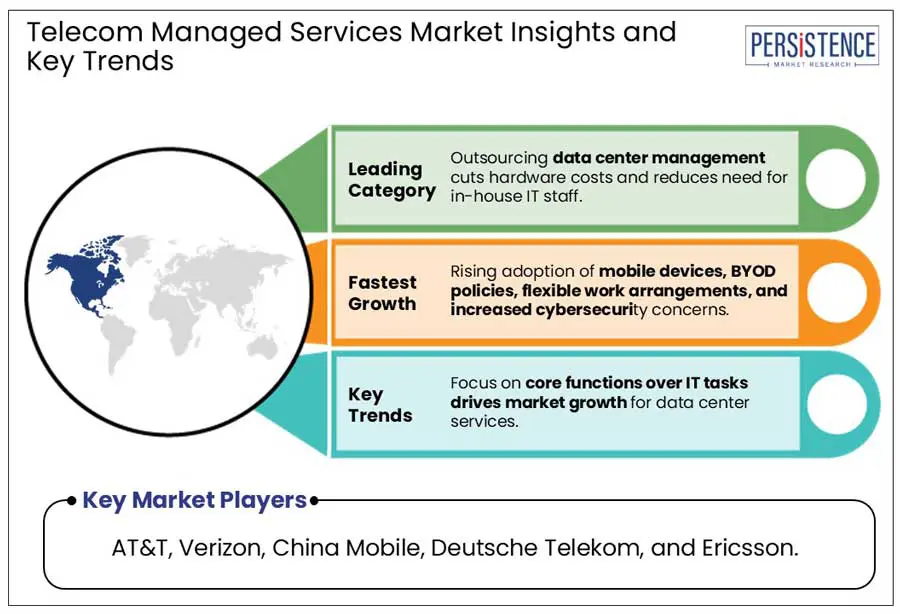ID: PMRREP35313| 198 Pages | 13 May 2025 | Format: PDF, Excel, PPT* | IT and Telecommunication

The global telecom managed services market size is projected to rise from US$ 30.16 Bn in 2025 to US$ 69.41 Bn by 2032. The market is further anticipated to register a CAGR of 12.7% during the forecast period from 2025 to 2032. According to the Persistence Market Research report, organizations increasingly focus on their core business objectives by outsourcing telecom-related services.
Delegating IT-related tasks to third parties enables cost reduction, enhancement of service quality, and enables teams to concentrate on their primary tasks. With the evolution of IT environments into increasingly complex systems through the integration of 5G technology, IoT, AI technologies, and cloud computing there is a growing need for constant operational support, accelerating the telecom managed service demand. These services include network management, security, cloud computing, and customer support enabling smooth and uninterrupted communication for businesses and individuals.
Organizations generally outsource the maintenance and day-to-day management of their network infrastructure and related services. Partnering with service providers helps maintain the network infrastructure at reduced overheads. When the COVID-19 outbreak disrupted businesses, triggering the shift to remote work and Bring Your Own Device (BYOD) policies, many organizations, including educational institutions, turned to Managed Service Providers (MSPs) for uninterrupted connectivity. These services assisted several businesses in transitioning to remote work models and supporting the increasing data traffic, thereby driving the telecom managed services market.

Key Industry Highlights:
|
Global Market Attribute |
Key Insights |
|
Telecom Managed Services Market (2025E) |
US$ 30.16 Bn |
|
Market Value Forecast (2032F) |
US$ 69.41 Bn |
|
Projected Growth (CAGR 2025 to 2032) |
10.9% |
|
Historical Market Growth (CAGR 2019 to 2024) |
12.7% |
With the telecommunications sector becoming increasingly complex due to technological advancements, including 5G, IoT, and cloud computing, managed services have become essential for aiding businesses adapt efficiently without sacrificing performance. Cloud computing, widely adopted by numerous businesses, offers scalable infrastructure, network services, and streamlined communication tools through a cloud delivery model. Telecom managed services ensure reliable cloud access, optimize bandwidth usage, and handle cloud-based communications infrastructure, which are integral for business continuity and scalability. Telecom managed services allow businesses to focus on their core competencies while leaving the complex tasks of managing telecom operations to experts, thereby reducing operational costs and enhancing efficiency and scalability in computing.
The global rollout of 5G transforms communication, with MSPs instrumental in simplifying its complex implementation and maintenance. They help in ensuring optimal performance with minimal disruption. For example, in December 2023, Verizon Business and Nokia concluded their 2023 5G Innovation Sessions tour in Dallas, highlighting the important role played by telecom managed services in supporting the deployment and optimization of 5G networks.
As telecom managed services involve outsourcing critical infrastructure and data management, businesses question the security and privacy of sensitive customer data. Compliance with global data protection regulations (GDPR in the EU, California Consumer Privacy Act (CCPA) (U.S.)) can be complex, and breaches cause severe legal and reputational consequences. When telecom MSPs face cyberattacks, it adversely impacts the infrastructure and puts the business data at risk, and disturbing finances, reputation, and customer trust.
Cybercriminals target telecom infrastructures for data volumes they accomodate. There is a possibility of insider threats when employees in the organization deliberately or inadvertently abuse access to sensitive information. Despite significant advantages such as scalability and operational flexibility, telecom managed services introduce substantial security and privacy concerns.
The growing digital transformation across various industries is a key trend driving the telecom managed services market. Rising demand for cloud-based solutions, AI integration, and IoT connectivity is fueling this shift, supported by a robust telecom infrastructure provided by telecom MSPs. Additionally, the surge in cybersecurity needs and the explosion of business data have amplified the demand for real-time analytics, business intelligence, and cloud-based data management, areas where telecom managed service providers offer critical support.
The BFSI sector is experiencing rapid digital transformation, with increasing adoption of blockchain technology, digital banking, and AI-driven analytics, which rely on a robust telecom infrastructure, executed through efficient MSPs. This enables banks to concentrate on their core function, i.e., banking. In October 2022, HSBC partnered with Oracle to accelerate its digital transformation.
By service type, the managed data center segment dominated the market and held a revenue share of 28% in 2025. Managed data center services involve outsourcing the management of data center infrastructure, including servers, storage, and network devices, to third-party providers. These services offer businesses cost efficiency by reducing the need for heavy investments in hardware and in-house IT staff. They warrant high reliability with 24/7 monitoring, backup, disaster recovery, and security protocols to protect confidential information. With the emergence of cloud and edge computing and hybrid IT environments, managed data center services support scalable solutions that permit businesses to concentrate on core activities while ensuring seamless and secure infrastructure performance. IBM provides businesses the ability to manage their workloads in a secure environment, supporting AI, cloud migration, and disaster recovery, and complying with industry regulations such as GDPR and HIPAA.
The managed mobility services segment is anticipated to witness the fastest growth in the coming years. This segment is witnessing rapid growth and is projected to reach over USD 33.3 billion by 2030, fueled by the rising adoption of mobile devices, BYOD policies, flexible work arrangements, and increased cybersecurity concerns. Enterprises across sectors use managed mobility services to restructure mobile device and application management, guarantee compliance, and improve data security.
Based on organization size, the telecom managed services market is segmented into large enterprises and SMEs. The large enterprises segment is anticipated to dominate, holding a revenue share of about 75% in 2025. As businesses grow, the need for streamlined and efficient telecom solutions becomes vital. MSPs customize their offerings to meet the specific needs of large enterprises, providing end-to-end solutions in network management, cybersecurity, and technical support. In addition, large enterprises are investing heavily in strategic partnerships with telecom managed service providers, fostering innovation and harnessing the benefits of economies of scale. These collaborations are implemented through long-term contracts that focus on continuous service improvement, personalization, and incorporation of IoT, 5G, and AI-powered analytics.
The SME segment is the fastest-growing due to the increasing reliance on digital infrastructure to remain competitive. While traditionally limited by budget and in-house expertise, SMEs choose MSPs to access economic, scalable telecom solutions that support business continuity, cybersecurity, and cloud integration. MSPs also tailor their offerings to meet the unique requirements of SMEs, making advanced telecom services user-friendly and cost-efficient for smaller businesses. For example, Tata Tele Business Services (TTBS) offered its Internet Leased Line offerings to Magic Bus India Foundation, enabling a seamless communication solution and customer engagement.

North America is anticipated to dominate the telecom managed services market, capturing a revenue share of about 25% in 2025. The high growth can be attributed to the presence of major telecom firms such as Verizon and AT&T and rising cyber threats. Another major driver is the higher incidence of faulty servers, posing major security risks that are tackled by companies through MSPs. For example, in early 2023, a misconfigured Amazon Web Services (AWS) S3 bucket exposed sensitive data of approximately 17,998 Nissan North America customers, highlighting the need for enhanced security solutions
The U.S. industry is projected to witness substantial growth owing to the increased BYOD adoption and growing smartphone and tablet usage in the professional sphere. The presence of key telecom players, growing data center deployments, and the impetus for better operational efficiency are further fueling the market growth. Also, the increased adoption of 5G, IoT, cloud computing, and strict regulatory compliance for data security and privacy boosts market demand.
The telecom managed services industry in Asia Pacific is likely to witness the fast-growth over the forecast period, driven by rapid digital adoption, rising mobile usage, booming e-commerce, and growing demand for high-speed connectivity and cybersecurity, especially in China and India.
China's telecom managed services industry is steadily growing, fueled by rapid digital transformation, 5G network expansion, and rising demand for cloud services and digital solutions. In 2024, Huawei and Alibaba Group made heavy investments in cloud services and AI-powered solutions to streamline operations and enhance customer experiences, driving the demand for the telecom managed services market growth.
Europe is anticipated to witness substantial market growth from 2025 to 2032. The major growth factors are the increasing need for agile business operations, growing preference for cloud technology and AI, surging demand for data centers, and the rising need for enhanced network security.
Germany telecom managed services industry is projected to register considerable growth during the forecast period. Increasing demand for managed security due to mounting cyber threats and the rise of cloud-based services lead to demand surge. In March 2025, Deutsche Telekom announced that it had forged a long-term strategic agreement with Google Cloud to enhance its operational efficiency.
The global telecom managed services market is highly fragmented with established industry leaders and emerging players competing for market share, creating a dynamic landscape. Key growth strategies include geographic expansion, new product launches, ongoing investments in R&D, and strategic partnerships. The prominent players have set their positions in global industry through service delivery, adopting disruptive technologies, and offering customer-centric solutions. The new players are offering niche personalized services as per regional or industry-specific needs. Such initiatives are anticipated to aid companies in cementing their market position during the forecast period.
The global market is projected to value at US$ 30.16 Bn in 2025.
The telecom managed services market is driven by the emergence of 5G technology, IoT, and cloud computing. These advancements increase the need for continuous operational support, and partnering with service providers enables efficient network infrastructure and lower overhead costs.
The market is poised to witness a CAGR of 12.7% from 2025 to 2032.
The growing digital transformation across industries is a market driver. Increased demand for cloud solutions, AI integration, IoT connectivity, and cybersecurity solutions is fueling this shift.
Major players in the telecom managed service include AT&T, Verizon, China Mobile, Deutsche Telekom, and Ericsson.
|
Report Attribute |
Details |
|
Historical Data/Actuals |
2019 - 2024 |
|
Forecast Period |
2025 - 2032 |
|
Market Analysis |
Value: US$ Bn |
|
Geographical Coverage |
|
|
Segmental Coverage |
|
|
Competitive Analysis |
|
|
Report Highlights |
|
|
Customization and Pricing |
Available upon request |
By Service Type
By Organization Size
By Deployment
By Region
Delivery Timelines
For more information on this report and its delivery timelines please get in touch with our sales team.
About Author